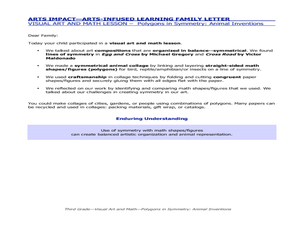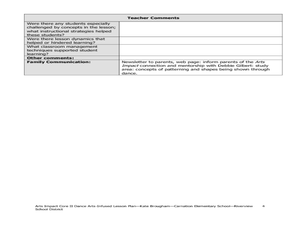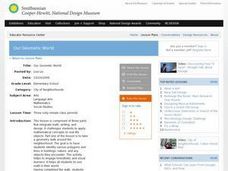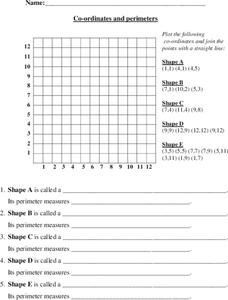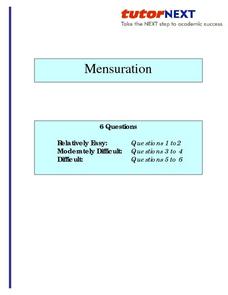Curated OER
What's in a Shape?
Students explore characteristics of shapes by making and using tangram sets. They discover how the tangram pieces are related to one another, and determine how many different combinations of the triangles, squares, and parallelograms in...
Curated OER
Polygons in Symmetry: Animal Inventions
Fourth graders use polygons to create animal figures with symmetry. In this polygons and symmetry activity, 4th graders create a symmetrical animal collage by cutting and gluing geometric shapes and figures from math activities.
Curated OER
Arts Impact and Math
Third graders incorporate math into dancing. In this algebra lesson, 3rd graders identify different shapes and patterns using dance movements. They relate the different creations to polygons as they incorporate the use of stretchy bands...
Curated OER
Dancing Polygons and Non-Polygons with Patterns
Second graders study movements. In this dance instructional activity, 2nd graders draw patterns selecting one to represent through movement with their body.
Curated OER
Attributes of Polygons: Stretchy Shapes
Fourth graders use dancing methodology in a polygon and shape activity. In this shape and dance instructional activity, 4th graders discuss shapes in dance, math, and everyday life. Students use dancing activities to recognize and...
Curated OER
Our Geometic World
Students walk around the neighborhood and identify various polygons and lines in buildings, nature and other objects. They design a building using various geometric patterns, shapes and lines. Students complete a descriptive writing of...
Curated OER
Circles, Squares, Triangles and Rectangles In Our World
Here is an engaging geometry lesson which has students identify the properties of shapes and cut shapes out of magazines. They make cookies using cookie cutters in various shapes.
Curated OER
Area of a Parallelogram
Fifth graders will use geoboards to construct parallelograms. They will determine the area of a rectangle and then apply that thinking to determine the area of a parallelogram. Note: The format of this lesson is much like a PowerPoint,...
Curated OER
Coordinates and Perimeters
Here is a lesson containing a great activity based on coordinates, and the perimeters of shapes created using a given set of coordinates. After youngsters creat a shape on a grid based on some coordinate pairs, they must identify which...
Curated OER
Metallic Mosaic
Students engage in a lesson about polygons while creating a mosaic pattern. They concentrate upon creating a pattern that is geometric and has the look of a quilt design. The lesson includes steps to complete the project and helpful hints.
Curated OER
Pop-it...Stop-it
Students observe how certain geometric shapes can be used to make some structures rigid and others flexible. The activity involves construction of a 30-60 right triangle, folding while following directions, and identifying polygons.
Curated OER
Mensuration: Area
For this area worksheet, students read story problems, draw diagrams, and find the area of described polygons. This eight page worksheet contains six problems. Answers are provided.
Curated OER
Brother In The Box
Students investigate the concept of finding the area of a parallelogram. The lesson uses a story that is told as an illustration to help straighten the confusion associated with the concept. Students could construct parallelograms for...
Curated OER
Semester Review Worksheet: College Prep Algebra
In this semester review worksheet, students simplify given expressions. They translate word sentences into algebraic expressions, solve equations through substitution, and find the value of a variable in a given equation. This worksheet...
Curated OER
Perimeter & Area Worksheet I
In this perimeter and area worksheet, students find the perimeter and area of regular polygons. They identify the perimeter and area of polygons such as triangles, trapezoids, circles, rectangles, and parallelograms. Students write the...
Curated OER
Perimeter and Area Worksheet II
In this perimeter and area worksheet, students find the perimeter and area of polygons. They use the proper formula to find the perimeter and area of circles, parallelograms, triangles, and rectangles. Students complete solve ten problems.
Curated OER
Perimeter of Shapes
These squares and rectangles have length and width measurements with decimals; can young geometers determine the exact perimeter of each? Using a step-by-step example as guidance, they show work to find the perimeter of each of these...
Curated OER
Pythagorean Theorem
For this measurement lesson, learners examine the Pythagorean Theorem, perimeter, and areas of right triangles. They record their measurements and research their findings on a grid.
Curated OER
Six Exercise Sets on Transformations
Middle and high schoolers solve fifteen problems from six exercise sets covering transformations, reflections, rotations, and enlargements. The solutions are provided.
Curated OER
Caley Table for the Symmetries of a Square
Middle and high schoolers complete Caley's table to indicate rotating a square 90, 180, and 270 degrees. They also reflect a square across the vertical and horizontal line. This one-page worksheet contains eight movements.
Curated OER
Tessellations: Geometry and Symmetry
Students explore the concept of tessellations. In this tessellations lesson, students use an applet to construct tessellations. Students use regular polygons to construct tessellations. Students find patterns and symmetry in their...
Curated OER
Understand Categories of Shapes
This colorful set of shapes and figures is the data set learners need to fill out an extensive table. For each of 11 types of shapes or figures they record the quantity and how many corners and sides each has. This becomes more difficult...
Curated OER
Circles and Square Based on Position
Kindergartners demonstrate their understanding of the position of objects in the environment by drawing a circle around all the pictured objects positioned above the line. They then draw and X on top of everything below the...
Curated OER
Simple Area of a Rectangle
What is the area? Because there is only one problem here (and it is followed by a detailed explanation) use this as an all-class warm up. Cover up the bottom half until scholars have shared their own answers. They examine a rectangle...



